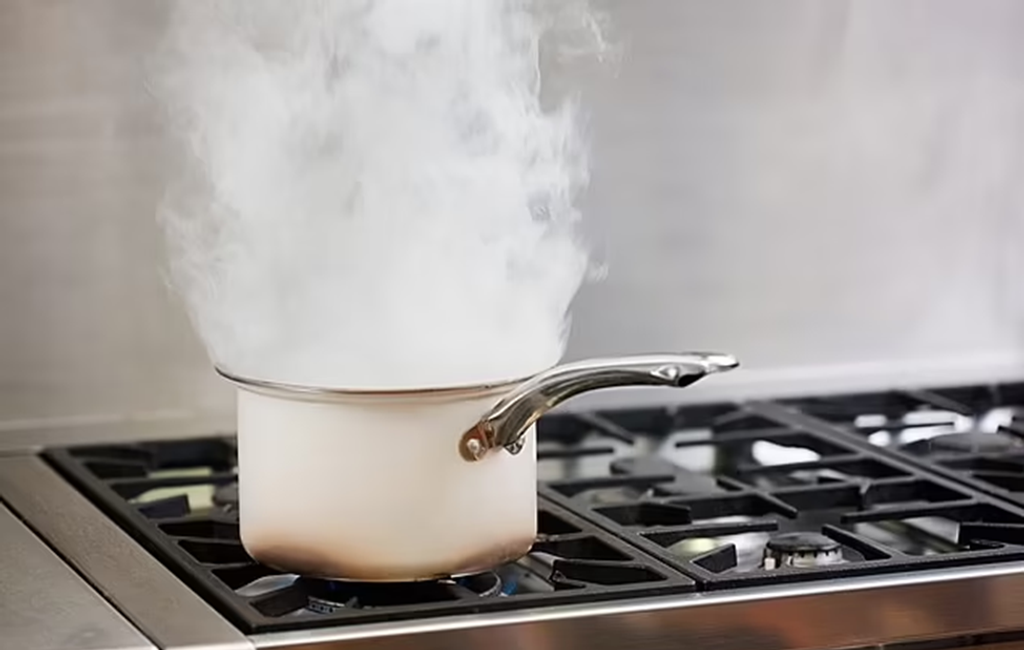In 2023, a surge in cases of a rare but concerning condition known as ‘Teflon flu’ sent over 250 Americans to the hospital, marking the highest number of incidents since 2000. This condition, formally known as polymer fume fever, presents with flu-like symptoms, including fever, body aches, and chills, and is often caused by inhaling toxic fumes released from overheated nonstick pans.
What is ‘Teflon Flu’?
‘Teflon flu’ occurs when nonstick cookware, typically coated with polytetrafluoroethylene (PTFE), is heated above 500 degrees Fahrenheit (260 degrees Celsius). The PTFE breaks down at this temperature, releasing fumes that can cause severe respiratory irritation. These symptoms are often mistaken for common illnesses, making diagnosing the condition difficult.

‘Teflon flu’ occurs when an individual inhales fumes released from an overheated nonstick pan coated with PTFE (polytetrafluoroethylene).
Rising Cases and Growing Concerns
According to America’s Poison Centers, there have only been 3,600 suspected cases of polymer fume fever over the past two decades. However, 2023 saw an unprecedented spike in cases. Julie Weber, director of the Missouri Poison Center, attributes this increase to improper use of nonstick cookware. “A lot of this comes down to people not following instructions and using things properly,” she noted.
The Chemistry Behind the Concern
Nonstick pans are coated with PTFE, a type of PFAS (per- and poly-fluoroalkyl substances), commonly known as ‘forever chemicals.’ These chemicals resist breaking down in the environment and can accumulate in the human body over time. While occasional exposure may not be harmful, chronic exposure, especially through daily use of nonstick pans, can lead to significant health risks, including cancer, infertility, and pregnancy complications.
Why the Surge in 2023?
The exact reason behind the increase in cases is unclear, but the global market for nonstick cookware grew, valued at $1.7 billion in 2017. This suggests that more people may be using these pans without proper knowledge of how to use them safely.
Preventive Measures and Alternatives

Experts recommend always adding butter, oil, or water when heating nonstick pans to prevent overheating and the breakdown of the coating’s chemicals.
To avoid the risks associated with ‘Teflon flu,’ it’s crucial to use nonstick cookware correctly:
- Avoid overheating: Never heat an empty pan or exceed 500 degrees Fahrenheit.
- Use proper utensils: Avoid metal that scratches the surface and release PTFE particles into your food.
- Choose alternatives: Consider using stainless steel, ceramic, or cast-iron cookware, which do not pose the same risks.
Lisa McManus from America’s Test Kitchen recommends adding butter or oil before heating a nonstick pan to prevent overheating and create a barrier between the food and the pan surface.
Conclusion
While nonstick cookware is convenient, knowing the potential health risks associated with improper use is essential. With proper precautions, these pans can be used safely, but exploring alternative cookware options may be wise for those concerned. As awareness grows, it’s hoped that cases of ‘Teflon flu’ will decline, keeping kitchens safe and health concerns at bay.
Disclaimer Statement: This information is from a third-party health news channel. The opinions expressed here belong to the respective authors/entities and do not reflect the views of Docquity. Docquity does not assure, endorse, or vouch for any of the content and bears no responsibility for it in any way. It is essential to take all necessary steps to ensure the information and content provided are accurate, current, and verified. Docquity disclaims any express or implied warranties related to the report and its contents.
References
- US suffering record levels of little-known illness ‘Teflon flu’ that spreads from common household appliance [Internet]. Accessed on July 25, 2024. Available from: https://www.dailymail.co.uk/health/article-13659305/US-record-levels-Teflon-flu-nonstick-pan.html
- Correia MS, Horowitz BZ. Polymer Fume Fever. [Updated 2023 Aug 4]. In: StatPearls [Internet]. Treasure Island (FL): StatPearls Publishing; 2024 Jan-. Available from: https://www.ncbi.nlm.nih.gov/books/NBK594276/
About Docquity
If you need more confidence and insights to boost careers in healthcare, expanding the network to other healthcare professionals to practice peer-to-peer learning might be the answer. One way to do it is by joining a social platform for healthcare professionals, such as Docquity.
Docquity is an AI-based state-of-the-art private & secure continual learning network of verified doctors, bringing you real-time knowledge from thousands of doctors worldwide. Today, Docquity has over 400,000 doctors spread across six countries in Asia.
Meet experts and trusted peers across Asia where you can safely discuss clinical cases, get up-to-date insights from webinars and research journals, and earn CME/CPD credits through certified courses from Docquity Academy. All with the ease of a mobile app available on Android & iOS platforms!







